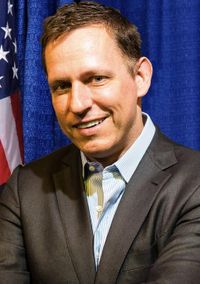In the complex world of modern intellectual discourse, few figures stand out like Eric Weinstein, a mathematical physicist and economist whose unconventional views have sparked both admiration and skepticism. As a prominent member of the so-called Intellectual Dark Web, Weinstein argues that true societal change arises from those who resist conformity and challenge prevailing narratives.
Born on October 26, 1965, Weinstein, now 59, has built a multifaceted career that spans academia and finance. He graduated from Harvard University in 1992 with a PhD in Mathematical Physics and holds both a master's and bachelor's degree in Mathematics from the University of Pennsylvania. His academic journey also includes fellowships at prestigious institutions like the Racah Institute of Physics in Jerusalem and MIT.
Weinstein’s career took a significant turn when he began working with billionaire investor Peter Thiel in 2013. Initially serving as an economist and consultant, he eventually became the managing director at Thiel Capital, a position he held until 2022. His relationship with Thiel has been described as both professional and intellectual, with the two engaging in deep discussions about various topics.
In addition to his work in finance, Weinstein is known for his groundbreaking theory of everything, dubbed Geometric Unity. This ambitious framework aims to unify the fundamental forces of physics, proposing a 14-dimensional space called 'observerse' that encompasses our familiar four-dimensional spacetime. In a 2013 article in The Guardian, Weinstein claimed to have cracked the theory of everything, though his ideas have faced skepticism from the scientific community due to the lack of published academic papers supporting his claims.
Weinstein also coined the term "Intellectual Dark Web" in 2018, referring to a group of thinkers who challenge mainstream narratives on topics such as identity politics and political correctness. This group includes notable figures like Ben Shapiro and Sam Harris, who, like Weinstein, utilize alternative media platforms to disseminate their ideas.
His personal life is as intriguing as his professional one. Weinstein is married to economist Pia Malaney, whom he wed in 1996. Malaney, who has a PhD in economics from Harvard, has collaborated with Weinstein on various projects, including their shared discovery of the Gauge Theory's implications for economics. Together, they have two children, Naila and Zev. Despite their success, Weinstein emphasizes the importance of resisting societal pressures, stating in a 2019 interview with Big Think, "You want people who, when asked to push the buzzer to administer an electric shock, tell the experimenter to buzz off rather than the people who go along with it when they're assured that they will not be held personally responsible."
Weinstein's intellectual pursuits extend beyond physics and economics. He has also made a name for himself as a podcast host, launching The Portal Podcast in 2019. The show features in-depth conversations with influential guests, including neuroscientist Sam Harris and entrepreneur Andrew Yang, allowing Weinstein to explore a wide array of topics and ideas.
Despite his impressive credentials and contributions, Weinstein's views have not been universally accepted. His theory of Geometric Unity, while ambitious, has not been embraced by the scientific community, and he has faced criticism for his lack of formal publications. Nevertheless, he continues to advocate for the importance of intellectual freedom and the necessity of questioning established norms.
In a world increasingly characterized by conformity, Eric Weinstein represents a voice of dissent, urging individuals to embrace their unique perspectives and challenge the status quo. His journey from academia to finance and beyond illustrates the complexities of modern intellectual discourse, where the lines between fact and opinion often blur.
Meanwhile, on the political front, another influential figure, Peter Thiel, has made headlines for his significant impact on American politics and technology. With a net worth of $17.5 billion, Thiel is best known as the co-founder of PayPal and Palantir Technologies, and an early investor in Facebook. His financial backing has been pivotal for various Republican candidates since 2000, including a notable $1.5 million donation to pro-Trump groups during the 2016 election cycle.
Thiel's relationship with Donald Trump has been particularly noteworthy. Officially joining Trump's transition team in 2016, Thiel's involvement raised ethical concerns, given that Silicon Valley stood to gain from Thiel-backed candidates in key tech positions. His influence on the Trump administration is evident, with over a dozen individuals connected to Thiel taking roles within the government.
However, Thiel's support for Trump has waned in recent years. In 2020, he distanced himself from Trump's re-election campaign, citing the economic fallout from the COVID-19 pandemic. By 2023, tensions between Thiel and Trump surfaced after the former president criticized Thiel for not supporting his re-election bid. Despite this, Thiel has indicated he would vote for Trump in the upcoming 2024 election, especially after Trump selected Thiel ally JD Vance as his vice-presidential candidate.
Vance's relationship with Thiel dates back to 2011 when they met after Thiel's talk at Yale Law School. Thiel has played a crucial role in Vance's political rise, donating a record $15 million to his 2022 Ohio Senate race. This financial backing, alongside Thiel's connections, has positioned Vance as a significant player in the Republican landscape.
Thiel's political views are often described as a mix of libertarianism and nationalism, with interests spanning cryptocurrency and immigration policies. His controversial opinions, including statements on women's suffrage and political correctness, have sparked debates among political commentators.
As both Weinstein and Thiel navigate their respective domains, they exemplify the complexities of modern thought leadership. While Weinstein challenges conventional scientific narratives, Thiel wields significant influence in the political arena, raising questions about the intersection of technology, finance, and governance.
In conclusion, the paths of Eric Weinstein and Peter Thiel illustrate the diverse ways in which intellectuals can shape contemporary discourse. Their contributions to science and politics, respectively, serve as reminders of the power of ideas in an ever-evolving landscape.



